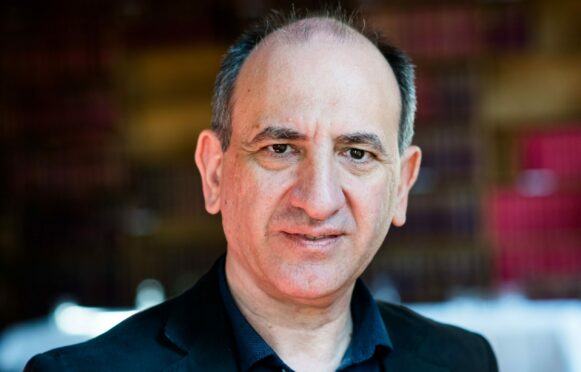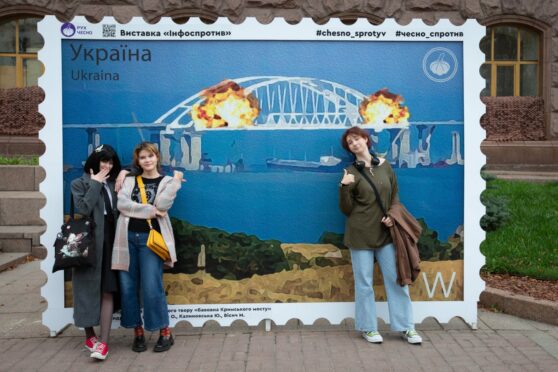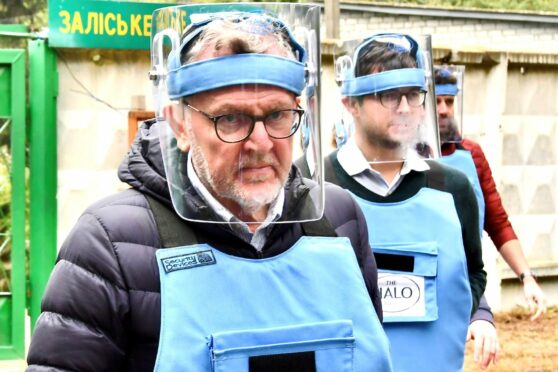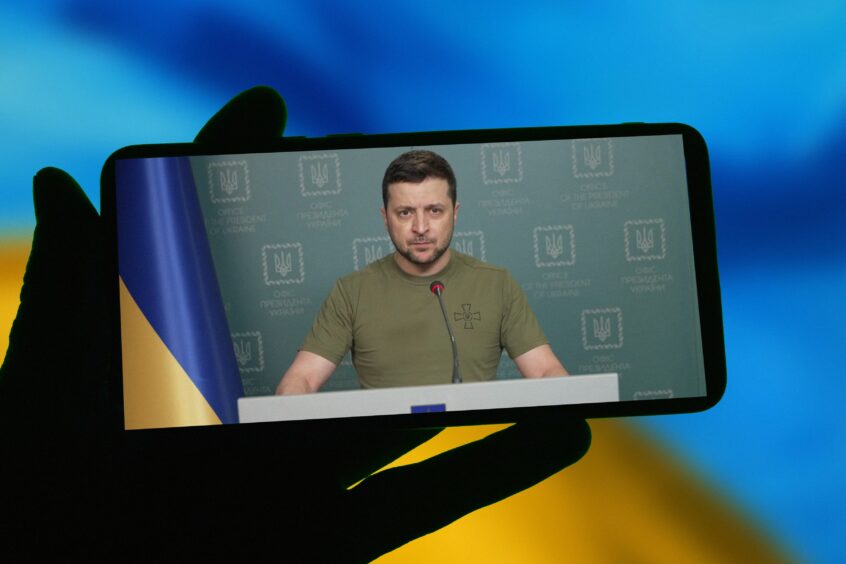
Karl Marx may once have suggested history repeats first as tragedy then as farce but, like all of us, Armando Iannucci sees only tragedy in the awful events unfolding in Ukraine.
The writer and satirist explored the politics of Russia in movie The Death Of Stalin, an acclaimed comedy drama in 2016, and filmed scenes in Kyiv-Pasazhyrskyi Station.
Today, he admits watching refugees in the same, familiar station now desperately trying to board trains to flee the shells and missiles raining on their city is chilling.
“Having shot historic and fictionalised scenes there, it’s weird to see them being played out for real,” said Iannucci, who also created the political comedy The Thick Of It, big-screen sequel In The Loop, and American version Veep.
“The railway station where I saw everyone clamouring to get on a train out of Kyiv was where we filmed people clamouring to get on a train to go to Stalin’s funeral. You think those things are from long ago, a different century, a different time, a different generation. Yet, here they are again, almost at your doorstep.”
When it was released, The Death Of Stalin was banned in Russia, with the film’s depiction of the social and political power struggle following the Soviet leader’s death branded offensive and extremist by state officials. However, the censorship – the first of its kind since the Soviet Union’s collapse – didn’t deter the Russian public, and the black comedy became the most illegally downloaded film in the country’s history.
Today, subversive commentary around Russia’s invasion of Ukraine has moved onto social media, with cartoons mocking Putin shared widely, and a Reddit forum dedicated to viral memes on the crisis popping up within days of the outbreak of fighting, all despite the Kremlin’s moves to shut down access to the likes of Facebook and Twitter.
Since the war began, Iannucci has filled his own Twitter timeline with a mix of news stories, footage from the frontline, and viral parody images that ridicule Russia’s leader. So, thinking of Stalin’s regime then, and Putin’s now, does he believe comedy can be used as a weapon.
He said: “When we were researching The Death Of Stalin, we went to Moscow and spoke to people who grew up under Stalin. They said that they used to circulate joke books about Stalin because it was the only way of being able to make sense of the absurdity. Even though, if you were telling one of these jokes and were reported, you could be shot.”
However, he admits, there is a danger when real-world events spread and become almost fictionalised online, adding: “There is a danger that this is considered some sort of social media war. It’s not. It’s an actual war, and it doesn’t matter how many follows and likes you get, it’s about whether you survive.
“There is a truth war involved as well. Putin is selling this lie to his country, and using the media to sell the lie. And we’ve seen how in America Trump can sell a lie how ‘he didn’t lose the election, it was all stolen from him’.
“It’s important we don’t just fall behind whatever it is we want to believe in. That, actually, we explore and really analyse, to find out what is true and what isn’t true, rather than just accepting things at face value, just because we agree with it.”
While there has, rightly, been an outpouring of vitriol for Putin’s actions, Ukraine’s president Volodymyr Zelensky has become an unlikely hero, a symbol of resistance. An actor and comedian turned world leader, he has stood firm in the face of escalating violence and tension, even refusing to leave his office in Kyiv.
Iannucci describes Putin as the “politician who’s looking like a fictional character from history” and Zelensky as the “actor who’s become the real-life hero” – but again warns against thinking of the invasion as something that’s only happening online.
“One mustn’t get too…” he falters, “I mean, Zelensky could be dead by next week. That’s the reality of it. That brings it home that this isn’t some drama we can all tweet about and give a thumbs up or thumbs down to. This is for real. These are real people.
“Nearly an estimated four million people, in the end, are going to be looking for somewhere to live. It’s just a wake-up call to anyone who thought democracy is fine and you don’t have to bother about it any more. Well, it’s not actually. You have to keep renewing and strengthening it.”
As for Putin, Iannucci, like most, can’t see his end game. He continued: “Putin still lives in the Soviet Union rather than Russia. That’s what defined him when he was in his 20s and 30s, working for the KGB and this massive Empire that extended beyond Moscow and across half of most of Eastern Europe.
“I remember someone telling me when we were researching The Death Of Stalin that Putin will have to stay in office forever. He will keep changing the constitution because the moment he leaves office, he will be killed. He’s made so many enemies, so has to stay in charge for the rest of his life. That’s his plan. He’ll do whatever it takes to maintain that, really.”
In the 17 years since the irreverent storylines of Iannucci’s co-creation The Thick Of It first aired on the BBC, real-world politics have, arguably, become stranger than fiction. Donald Trump sat in the Oval Office. Theresa May infamously walked into the Tory party conference robot-ing to Abba’s Dancing Queen. Boris Johnson hid in a fridge to avoid a journalist’s questions. Oh and, more recently, there was Partygate.
For someone whose bread and butter is mocking the government of the day, satire has become altogether more complicated for Iannucci. He said: “When we were doing The Thick Of It, it was a time when everyone knew what the rules were and, therefore, it was funny or interesting to see when the rules were being bent. But if there are no rules any more, if you can go out at a press conference and say you must stay indoors and you mustn’t have parties, and then five minutes later, you turn around and walk into a party, completely ignoring your own rules, then we’ve crossed the line.
“Showing how the rules are bent isn’t really what’s most important. It’s actually asking yourselves why the rules have been broken and why think there are no rules. It’s gone to a different level, really.”
With satire becoming more everyday, it’s perhaps unsurprising that Iannucci went in an entirely different direction with his latest work, Pandemonium, an epic mock-heroic poem, which explores the politics of the pandemic through verse.
The book, filled with Iannucci’s typical wit, anger and irreverence, started life as a personal lockdown project, and tells the story of how “Orbis Rex, Young Matt and his Circle of Friends, Queen Dido and the blind Dom’nic did battle with ‘a wet and withered bat’ from Wuhan”.
“I wanted to do something a bit more reflective that wasn’t drawing a conclusion, but was more of an attempt to try to just articulate what I feel was happening now,” he explained of the poem. “As it was happening, I was thinking, ‘Should I make something about this? Should it be a film? Should it be a drama?’
“I wasn’t expecting a poem, but I suppose, in the end, a poem seems the best way of trying to get the highs and the lows, the weirdness of it, and the sadness of it, as well as the absurdity. The fact it was public in terms of we were all watching it on our screens in press conferences, and yet private in that each of us had our own personal story to tell of lockdown. So, it was trying to do that. Something that connected with the public side as well as the personal side.”
He added: “I wasn’t planning to publish it. It was just a private thing I was writing. As it kind of grew and had a bit more momentum behind it, I sent it to my literary agent, and said, ‘Am I mad or is this worth pursuing?’
“Then we took it to the publisher and they said they wanted to print it. In fact, there’s plans for a stage version of it later this year, too. It was completely spontaneous. It wasn’t anyone asking me to write it. It just sort of happened really.”
The writer is currently working on a new film – it will explore “the themes of fake news, things like that” – as well as the second series of Avenue 5, his HBO sci-fi comedy series starring Hugh Laurie.
Having started his career at BBC Scotland in his home city of Glasgow – where he created iconic character Alan Partridge – the 58-year-old admits working in America on shows like Avenue 5 and Veep feels surprisingly full-circle. “The reason I work with HBO is it reminds me of the BBC,” he said. “They’re not about going big and they don’t do advertising. They want to be good, so they prefer quality rather than quantity. And that reminded me of when I first started at the BBC.”
Plus, he says, television has become increasingly global, so what once might have only worked for a British audience, is now seen by a huge audience.
He added: “The way we watch stuff has changed. Everything is accessible now. We watch Scandinavian drama. We watch things like Call My Agent from France. We’re less particular about where it comes from, and where it’s made. We’re just more interested in whether it is any good. Is it a good story? Is it funny, or interesting or original? It means that when you’re making something in the UK, in the end, it’s for an international audience, because it will go around the world, eventually.
“I mean, I was up in Glasgow last weekend and the number of American movies being shot there is extraordinary. That’s great because we’re no longer seen as just British or just Scottish or just whatever. We’ve become an international base, really, and that’s because we have the expertise and we have the skill – and the heritage as well.”
Pandemonium: Some Verses On The Current Predicament is out now

Enjoy the convenience of having The Sunday Post delivered as a digital ePaper straight to your smartphone, tablet or computer.
Subscribe for only £5.49 a month and enjoy all the benefits of the printed paper as a digital replica.
Subscribe







